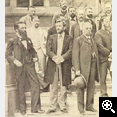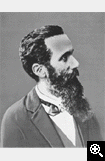|
|
|
| |
| |
Galileo Ferraris
| |

 |
|
was born in Livorno Vercellese (Vercelli) on 30th October 1847. In 1869 Ferraris graduated in Civil Engineering at the Application School for Engineers of Turin and was appointed soon as assistant of Technical Physics at the Royal Industrial Museum.
An important invention by Ferraris was the rotary field induced engine (May-June 1885). This device could be used both as an engine and as a counter of electrical power. With the name of Ferrariszahler, Ferraris's counter was mainly used in Central and Eastern Europe. Direct springs of this device were the very diffused induction-operated engines. The discovery which had a high impact in the industrial world, was diffused in 1888 with a note in the "Atti" (Acta) of the Academy of Sciences, of which he had been a member since 1880.
In 1877 he replaced
Giovanni Codazza, as an annually appointed lecturer of Technical Physics at the Royal Industrial Museum of Turin and later on as a no-competition titular due to "deserved fame of singular expertise" after an indication by the Hon.
Federico Spantigati, who at those times was the president of the Royal Museum.
In 1888 Ferraris started at the Royal Industrial Museum the School with Laboratory of Electrotechniques, based on five specific teachings: scientific Basics, industrial Production of electrical power, Applications, Measure, Exercises. Ferraris can then be considered as the founder of the Turinese Electrotechnic School that after him was driven by Guido Grassi,
Giancarlo Vallauri, Rinaldo Sartori.
In 1896 Ferraris participated to the Congress of Geneva, launching the idea of the Italian Electrotechnic Association (Aei), then settled in Milan on 27th December of the same year and whose he became president elected by acclamation.
The scientist was a member of the Academy of Sciences, the Academy of Agriculture (1880), the National Academy of Lincei, correspondant member of the Veneto Institute of Sciences, Literature and Arts (1889). Ferraris was also a municipal counsellor and alderman of the municipality of Turin (dal 1887), municipal counsellor of Leighorn (dal 1895 al 1897), senator of the Kingdom of Italy (since 1896).
He died in Turin on 7th February 1897.
|
| |
|
|

